Denis Ten is growing up
 September 19, 2011
By Reut Golinsky
Photo © Ksenia Fomina, Vicky Azhoychik, Denis Ten
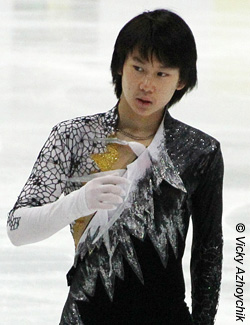 Denis Ten, the leading Kazakhstan figure skater, and I agreed to do this interview before Worlds in Moscow, but since then he was always very busy: competition, shows, work with his choreographer on the new programs, vacation at home to see all his friends and relatives. "In turned out that I travelled around the whole world," he laughs. "From Los Angeles to Moscow, from Moscow to Korea, from Korea to Toronto, from Toronto to Kazakhstan and now back to Los Angeles".
Denis Ten, the leading Kazakhstan figure skater, and I agreed to do this interview before Worlds in Moscow, but since then he was always very busy: competition, shows, work with his choreographer on the new programs, vacation at home to see all his friends and relatives. "In turned out that I travelled around the whole world," he laughs. "From Los Angeles to Moscow, from Moscow to Korea, from Korea to Toronto, from Toronto to Kazakhstan and now back to Los Angeles".
Read about last season and the upcoming one, old and new programs, St├ęphane Lambiel, Evan Lysacek and Daisuke Takahashi in our talk, which eventually worked out.
Denis, it's been a year since you came to the US to train, and now you are preparing for your second season there. Is there a difference from how you felt about your training a year ago?
Of course, last year's summer was really hard, I went through many changes. I moved to an unknown country as a stranger, I didn't know anything and needed to learn a lot. That's probably why last season was so hard. Besides, I lost lots of training time because I had problems with my boots. I switched them four times at the beginning of the season; the last time was just before the NHK. But as they say "bad workers often blame their tools"... (laughs)
About comparing last season to this one; I feel more comfortable already. And I hope that this next season will be better too.
Still, according to your last few interviews, you were altogether content with your season.
In general, yes, I was, because I could see progress. I could see the big difference between how I skated at the beginning of the season and at the end of it. For example, it wasn't until the end of the season that I felt more confident with my long program, which wasn't the case a year or two ago. I hope to continue this way; I already know what I need to work on next.
I would say that the peak of your form wasn't at the end of the season but at home, when you won the Asian Games. Am I right?
I had a turning point back then. We didn't settle my practice plan until late fall when my coaches started to work as one team, but we were able to prepare well for the Asian Games. There I suddenly had some problem with my ankle: during official practices I almost didn't skate, I made only a few jumps. My coaches were worried because we had worked so hard for this.
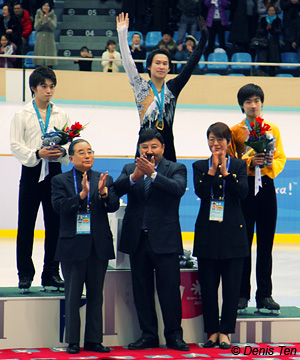 It was the biggest competition in my country for the past two years, and of course I was glad to compete at home for the first time. And the audience really supported me; when I skated I kept telling myself: "I can't fail them". I couldn't fail my country, my fans.
It was the biggest competition in my country for the past two years, and of course I was glad to compete at home for the first time. And the audience really supported me; when I skated I kept telling myself: "I can't fail them". I couldn't fail my country, my fans.
I didn't participate in the Four Continents Championships, so my coach and I had time to define the plan for my training for Worlds. But then this tragedy with the tsunami happened and everything was postponed. We even took a break at a certain point. You're right that I peaked at the Asian Games, but I was actually in even better shape in March, when the championships were supposed to be held. After that change it was hard to gain momentum once again, but we sportsmen need to learn from such things too.
If I compare your last two seasons, the Olympic one was very busy, even overloaded...
Yes, I even joked that during that season I missed only one competition: The World Synchronized Skating Championships!
And during last season it was the opposite; you didn't participate in any Senior B events at all.
I didn't, and I lost some points (in World Standings) because of it. But I couldn't afford to go to additional competitions and waste practice time, that's why I skipped them. The main thing was that I was in good form at the Asian Games. This season I want to do more competitions, not only for better ranking, but also to perform my programs more often in competitions. I think this last season my programs were a bit "raw" because I didn't compete enough.
I already took part in two competitions: at the Summer Skate in Thornhill, Ontario (62.18 for SP and 117.73 for LP) and at Rim of the
World in Ontario, California (64.31 for SP and 129.14 for LP). I wasn't really prepared for Thornhill, it was more like practice and it
was the first time I skated my long program. The competition in Ontario was also like a test skate, there were only two competitors there, both were Frank's students. The main goal was to check the levels of the elements and to skate one more time in front of the public. This competition went better, I felt more confident in my programs, but we still have lots of work to do. Overall I'm happy with my performances. My Axels were better than in Thornhill, I landed one in the short and two in the long, only one was with a small mistake. Hopefully in Oberstdorf it'll be even better. I also practice a quad now and I already land it sometimes, it's still early to add it to my program, but we reserved a place for it there, so maybe towards the end of the season I will try it in the competition.
When you mentioned your coaches; did you also mean Rafael Arutunian, who worked with you this past season?
Yes, him and Frank Carroll. Frank loves when his students diversify and work with different people, on and off the ice. Rafael was always at the rink, and it's not only me who takes lessons from him. He is very kind to me; we spend a lot of time together, as much as I do with Frank. And I'm very grateful to him. It happened that Frank couldn't go with me to the Asian Games and Rafael joined me instead. I felt very comfortable with him. He is an amazing person, it's always very interesting to listen to his stories about the days when Plushenko, Yagudin and Abt competed (Arutunian was Alexander Abt's coach - ed.). He actually witnessed all this and can tell details which interested me a lot when I followed this story as a child.
Rafael Vladimirovich is my coach too; I can't say that I have only one coach. I'm very fond of the team I have now.
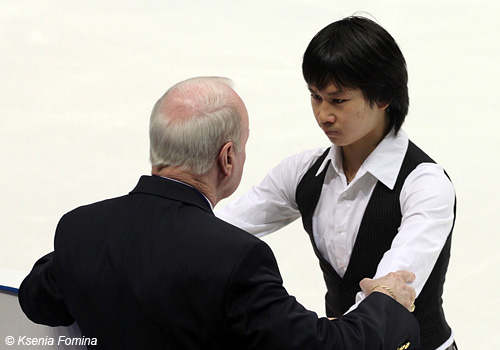
Kazakh press mentioned that you also worked with Igor Shpilband.
Indeed. Last summer I went to Detroit to visit Igor and Marina (Zueva); I wanted to practice with ice dancers to learn more about gliding. But I never planned to train with them as with my permanent coaches.
And earlier this year you went to Toronto and worked with Lori Nichol.
Yes, we made two programs with her. I actually really wanted to work with St├ęphane Lambiel again, but while in Toronto I had to change my plans, because the Swiss embassy rejected my visa application. I was really upset since St├ęphane and I already had everything planned. As you know St├ęphane is very busy, he has so many shows, so in the end we couldn't get together. But I hope we will during the season, I want him to check my programs and maybe give me some advice.
St├ęphane mentioned that it was your idea to work with him last season; during the "Kings on ice" tour you asked him to choreograph for you. Why St├ęphane?
We already knew each other; we met during the show in Switzerland (in Basel, in December 2009 - ed.). During the Olympic Games we didn't talk much because St├ęphane was really nervous, everyone was nervous actually, me too. And during the tour all the skaters were together a lot; we ate together, we went for walks together, we hung out with St├ęphane... As a skater he was always very interesting to me, and I always followed his performances. I especially love his program to Jacques Brel ("Ne me quitte pas", exhibition program of the 2009/10 season - ed.). Once someone asked him: "St├ęphane, now that you're retired, what will you do?" And he answered: "Don't know, I think maybe I'll try to choreograph". And then Florent Amodio and I jumped at this saying: "We want to be the first clients on your list!" Florent was probably joking, but I was serious. I proposed to St├ęphane to plan everything and asked him for advice, because you can learn so much from such a creative person. In the end we decided to meet and he came to Kazakhstan.
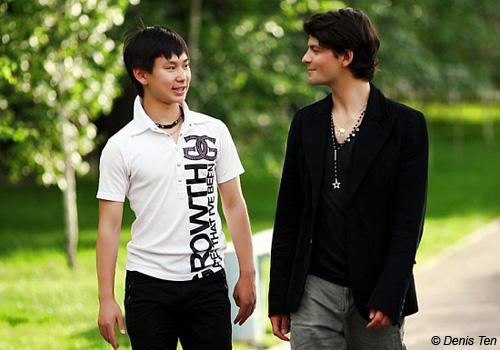
I recall how we stayed up till 3 in the morning trying to cut the music for the program. I have cut music before, for gala programs, and I thought it would be the same for the competitive one. But I spent more than 5 hours by the computer trying to put the pieces together. The whole trip was funny: St├ęphane came to Almaty, I showed him around the city and the next day we flew to Astana, where there are better ice rinks. But the weather was stormy, and for almost two hours we circled the city before we could land. I don't think St├ęphane will ever forget this adventure.
You picked the music for your short program. Why a tango?
I can explain. I had had this image of being a light-hearted young boy, and now I wanted to present myself on the ice as a grown up. I thought that a tango could be a good theme to evolve, become older. I won't remain a 16 years old teenager my whole life, will I? It was my idea, and I told St├ęphane that I wanted to take on more serious music; that is how we chose this tango version.
I know the program was changed since you worked together, and that St├ęphane couldn't come and help you with it before the season started. Who helped you make those changes?
I changed everything myself. It was only when we got new rules for step sequences that Nadia Kanaeva helped me out, she is one of the coaches I'm working with. But I tried to keep the style St├ęphane and I found for this program. St├ęphane probably would have done thing differently though...
 I think there are still traces of St├ęphane left in the program: the feeling, the mood. At least people were looking for him there.
I think there are still traces of St├ęphane left in the program: the feeling, the mood. At least people were looking for him there.
I was his first student, that's why I told him: "If people see part of you in this program, it's because they miss you". But I didn't try to copy him, because in general I don't like to copy anyone. (laughs) But I like his style and I wanted to show that mood. I can't say that I have my own style already, but I wanted to improve it, to diversify. I didn't plan to copy St├ęphane, and that probably wouldn't have worked out anyway.
It's funny how people sometimes look for St├ęphane so much in your skating, that they find him even in programs he never worked with you on. For example, this happened with the gala program you recently showed in Kazakhstan. Only later was it known that you choreographed it with Fedor Andreev.
We actually made this program last summer, during my visit to Detroit. Fedor wasn't skating with Jana Khokhlova yet and he worked with other skaters. I really liked training with him. Once I heard a song ("Cinema Paradiso" by Josh Groban - ed.) and I told him that I really liked that music and wanted to choreograph an exhibition program to it. He answered: "Let's do it". We tried different things, had fun while fooling around, and in the end we had the program done. During the season I didn't skate it, but I performed it during the recent shows in Korea, and also skated it at a few events in Kazakhstan. The discussed video was probably the first recording of the program which was uploaded to the Internet, but by then the program has suffered many changes. I forgot parts of what Fedor choreographed, so parts were simply my improvisation. Maybe people thought it resembled St├ęphane, because lyrical images suit him well and he too had a program to Josh Groban ("Un giorno per noi", exhibition program of the season 2007/08 - ed.). Maybe it somehow reminded people of him, I don't know.
St├ęphane told me the story behind your short program, he always makes up stories for his programs. I wonder if there is a story behind your long as well.
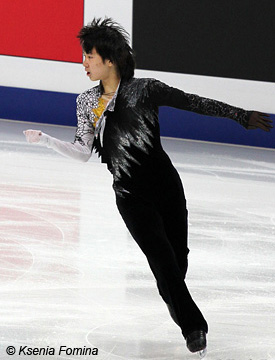 Yes, you know St├ęphane inspired me so much with his approach, that I came to Lori and described the full "script" of my long program! The music is very sad at the beginning, like the feelings of a person whose heart is heavy. For example, he fought for the love of his life, but lost and she was taken far away. In such a moment you want to leave everything, to give up. And suddenly some kind of rage appears inside this person - this is the theme which starts after the jump combination - and he says: "No, I can do it, I will bring her back!" The dark forces in him take over, and he starts working hard. The music during my first step sequence is about his battle, it tells how he overcomes obstacles on his way. His friends may think that they lost the person they knew before, that he became evil and cruel forever. But at this point the music changes, it becomes beautiful and kind, as if the hero of this story opens his heart and shows that he has remained the same. The black and white parts of his soul merge. In the beginning they repel like particles in physics that have the same sign. In the program it happens before my last two jumps - I do a triple loop and then a triple Lutz - but afterwards those parts of the soul join together and the person becomes much more powerful. The last step sequence is the last fight, which our hero wins. So my program tells the story of a person who lost to his enemy, worked hard, overcame himself and in the end won.
Yes, you know St├ęphane inspired me so much with his approach, that I came to Lori and described the full "script" of my long program! The music is very sad at the beginning, like the feelings of a person whose heart is heavy. For example, he fought for the love of his life, but lost and she was taken far away. In such a moment you want to leave everything, to give up. And suddenly some kind of rage appears inside this person - this is the theme which starts after the jump combination - and he says: "No, I can do it, I will bring her back!" The dark forces in him take over, and he starts working hard. The music during my first step sequence is about his battle, it tells how he overcomes obstacles on his way. His friends may think that they lost the person they knew before, that he became evil and cruel forever. But at this point the music changes, it becomes beautiful and kind, as if the hero of this story opens his heart and shows that he has remained the same. The black and white parts of his soul merge. In the beginning they repel like particles in physics that have the same sign. In the program it happens before my last two jumps - I do a triple loop and then a triple Lutz - but afterwards those parts of the soul join together and the person becomes much more powerful. The last step sequence is the last fight, which our hero wins. So my program tells the story of a person who lost to his enemy, worked hard, overcame himself and in the end won.
Unfortunately, it wasn't until the end of the season that I started to skate this program with confidence. The program was even more difficult when it was first choreographed, it was full of steps, but we had to remove some parts of the choreography, because I wasn't able to skate it right. The whole season I tried to get used to it, worked on it, but I still had the feeling that I wasn't able to unlock the potential it had.
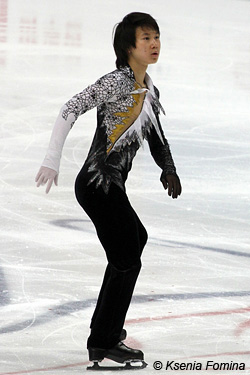 Tell me about the programs for the next season.
Tell me about the programs for the next season.
I will try again to show more mature skating in both my short and long programs. Last season I was still a bit "under-ripe". (laughs) After my performance at Worlds, St├ęphane told me that in his opinion my programs were not for a mainstream audience, that some spectators didn't get them. I answered that this is what always happens, people have different tastes. But he contradicted: "Yes, and if you're already a World champion, you can afford that. But while you're still young, you take a big risk if someone likes what you do and someone else doesn't." But I want to try everything and self-actualize on the ice while I'm still young. That's why this next season my programs will be very mature again, I won't do anything light-hearted, like...
...like "Sing Sing Sing", for example?
Yes, that program was very cheerful, and I think it fit my personality better. But I want to work in other directions; it will help me become more professional. I can always go back to my old image if I want. A sporting career is very short. It seems like I'm only 18 years old and everything lies ahead, but then one day I will wake up and find that I'm retired.
Who chose the music for the upcoming season: you or Lori?
We chose it together, both for the short and for the long. For my short program we decided on "Elegie" by Rachmaninov, performed by Mischa
Maisky on the cello, which makes this version unusual and new, because I'm mostly used to Rachmaninov's music performed on the piano. And for the long it's a very famous piece by Astor Piazzolla, "Adios Nonino", written in memory of his father
For the long program it took us a particularly long time to choose; we couldn't figure out what we wanted or in which direction we wanted to continue. We listened to music for something like six hours, and in the end we recorded about eight different music pieces on the CD, went on the ice and only then finally made up our minds. When we started to work on the program Lori immediately said: "Denis, we were right, this is what you need; you were born for this program".
The program is very complicated, even more complicated than the last one; I hope I will be able to prepare it well. And I think that this season's programs, especially the long, will appeal more to the mainstream audience.
St├ęphane said about you: "I could see a little bit of myself in him; he is a perfectionist and he really knows what he wants". Is that how it is?
I'm pleased to hear that. I don't know to what extent we're similar, but I am indeed a perfectionist, I absolutely can't stand when something goes wrong. And I need to suppress this feeling all the time. My physical trainer tells me there is nothing wrong with this quality, but I need to work on it and always stay calm, since in this life anything can happen. 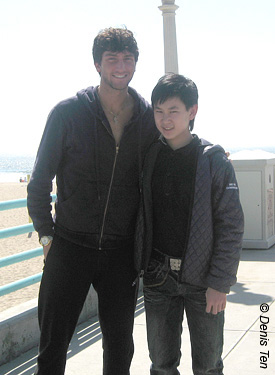 But I really try to take things seriously and not let things slide, and to finish every task I start. We have Evan Lysacek skating with us now, and he is a great example of how one should be: always very calm, hard-working. We - the young skaters - are all very motivated by him.
But I really try to take things seriously and not let things slide, and to finish every task I start. We have Evan Lysacek skating with us now, and he is a great example of how one should be: always very calm, hard-working. We - the young skaters - are all very motivated by him.
I actually planned to ask you about this. Will anything change for you now that Evan is back? Frank didn't discuss it with you?
No, he didn't. We don't think about such things, both Frank and Rafael always find time. I also have the freedom to come and skate whenever I want, in addition to my scheduled training times. And if the coaches are on the ice they will always help, give some advice. This is great.
So you didn't think even for a moment: "Evan is back, now I will go on the back burner".
Nobody has thoughts like that, it's the opposite this gives us the biggest motivation. Evan works so hard! Of course everybody tries to learn from him. The ability to work that hard probably comes with age. Or maybe only Evan can do it. He is very hard-working and, when he is on the ice, he is fully concentrated on his skating and what he has to do. He also knows how to pull himself up at just the right time. This is what I always loved at competitions, only Yagudin and Plushenko knew how to do that and now Evan. You can say they have nerves of steel; they were always concentrated, and never let their emotions take over, they had complete self-control.
You praise Evan so much, what do you think about his chances of a triumphant comeback?
I don't know, he just started to train. But in general figure skating changes very fast, so it's hard to predict anything. I personally love interesting skating. I care less about who skates, but when he skates well it's great. I think this is the most interesting part of figure skating, when you have something to show people on a video afterwards. I know many people - in Kazakhstan but not only there - who don't have the slightest idea what figure skating involves, and I introduce them to skating through recordings of different skaters and their performances.
Suppose a person came to you and said: "I don't know anything about figure skating, you have 10 minutes to show me the three best skating videos on YouTube". What would you show him?
No, it doesn't work that way. (laughs) First I always tell some stories about the past years, about the new judging system since people don't understand what it is. I talk about the jumps, that now not only the jumps earn points, but also transitions, steps, spins... I tell them about the battle of the Brians and of Alexei Yagudin and Evgeny Plushenko, and about other great skaters. This way, little by little I fuel their interest. And when a person is already interested, I show him some videos. Since I'm a friend of St├ęphane's, I always want to show his skating, I say: "Look at St├ęphane!" or "Look at the program he choreographed for Daisuke Takahashi!" Or I show some old videos of John Curry, for example. It can differ because it depends on the taste of the person I'm talking to. And in general I say: "Just turn on your TV and watch the World championships!"
You mentioned in another interviews that you try to follow competitions, and to watch the performances of your rivals.
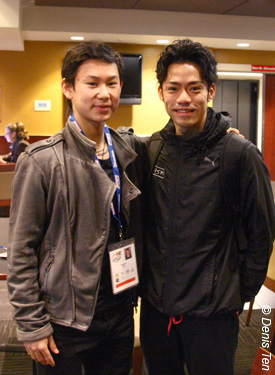 Yes, not that I try to spy on them, but I'm interested since I learn something from them. For example, before Worlds I watched a lot of videos of Daisuke Takahashi, just because I missed him. The first time I saw him was in Moscow, in 2005. He skated so well then. We were allowed to watch all the practices, there we could see St├ęphane, Evgeny Plushenko, Brian Joubert. And Daisuke Takahashi too. He was the youngest among them and I remember that during the practice he didn't succeed with the quad. He couldn't do it: couldn't land it or didn't have the full rotation. And then during the qualifications he went for it and nailed it! And in the short he had a quad - triple and he landed it as well. This is how people remembered him, and the audience loved him.
Yes, not that I try to spy on them, but I'm interested since I learn something from them. For example, before Worlds I watched a lot of videos of Daisuke Takahashi, just because I missed him. The first time I saw him was in Moscow, in 2005. He skated so well then. We were allowed to watch all the practices, there we could see St├ęphane, Evgeny Plushenko, Brian Joubert. And Daisuke Takahashi too. He was the youngest among them and I remember that during the practice he didn't succeed with the quad. He couldn't do it: couldn't land it or didn't have the full rotation. And then during the qualifications he went for it and nailed it! And in the short he had a quad - triple and he landed it as well. This is how people remembered him, and the audience loved him.
When you can watch such personalities live, it is so interesting! And to see such a competition, how everything is done... you can't believe that sooner or later you will have a chance to compete at such event. I thought about it sometimes: "Now you can't just sit in the bleachers and watch the competition, now it's you who have to prepare and people will watch you". When you're a child you train, you compete, but you can't even imagine that you will ever skate in a major competition. And when you come to such competition you say: "I can't believe it!"
But now you comprehend that you're competing with all those you watched from the bleachers or on TV, don't you? When did this transition happen for you?
It still hasn't happen. I can't place myself on the same level as leaders; I think it would be just stupid because I still need to learn so many things. I need to acquire skills that leading skaters already master. But when this moment comes I will tell you! There is lots of work ahead, I see it every day and that's why I train and train. Of course I hope that one day I will be able to rise to such high level, that someone will compare me to one of the greats of this sport.
The next competitions in Denis Ten's schedule are the Nebelhorn Trophy, Skate America and Skate Canada. We wish him a fruitful season and lots of luck!



